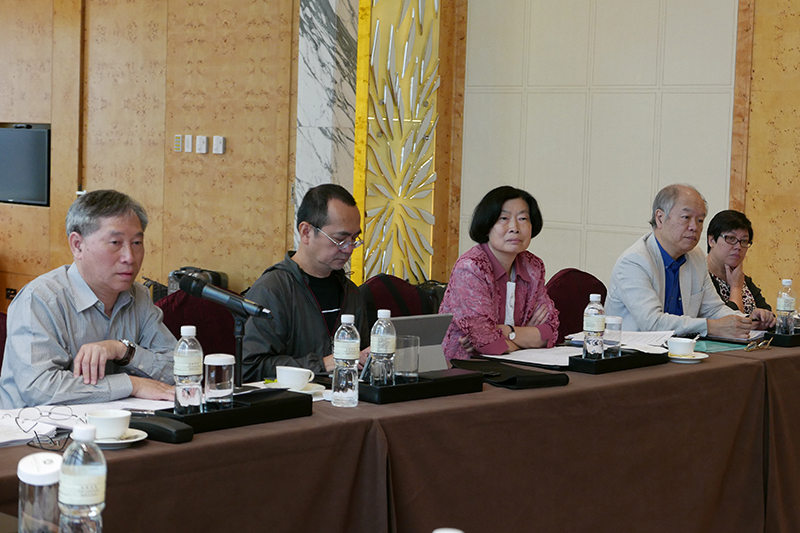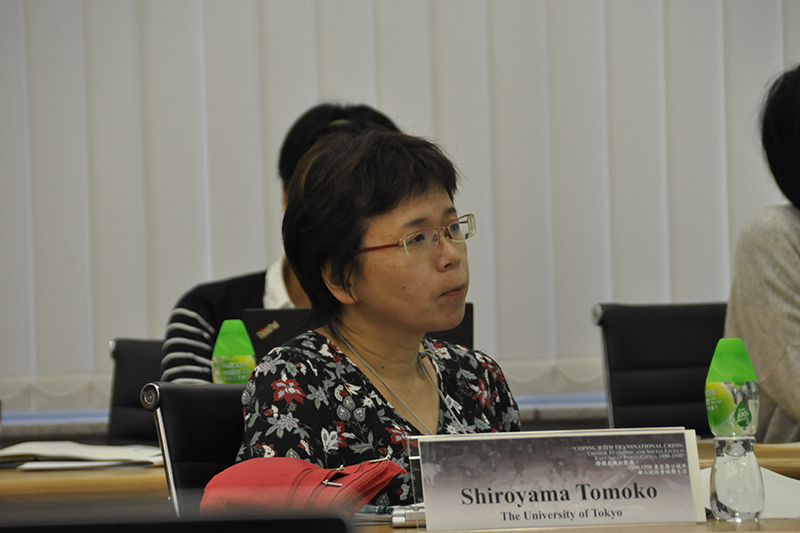Department News
Message from Department Chairman
The plaque hung on the wall of the common room in the History Department displays the famous quote by Sima Qian, the author of the Records of the Grand Historian (Shiji 史記):
Studying the relationship between the heaven and man, looking through the changes taken place from ancient to present times, one can form his personal opinion. (Han Shu, “Biography of Sima Qian”)
The quotation from Sima Qian is highly eulogized and regarded as the paradigm by historians. Historians dedicate themselves on researches, hoping to provide clarification and explanation of changes in human history. They formulate own opinion and present them with clarity and accuracy to the general public. Liu Zhiji 劉知幾, one of the most critical Tang historian, claims shicai 史才, shixue 史學, shishi 史識 the three indispensable instincts of historians. Historians should be well trained in historical knowledge, competent in writing and, above all, able to demonstrate the principle of “straight writing 直書 zhishu” – upholding historians’ moral responsibility in recording the truth. In writing, they ought to ground their arguments on facts and evidences to their utmost effort. Therefore, I would like to share Sima Qian’s and Liu Zhiji’s advice and experiences with every history student, wishing you to build a solid foundation for the sustained development of historical knowledge, and to keep a clean heart and mind as well even in the face of adversity.
LAI Ming Chiu
Welcome back!
Hope you all had a wonderful summer and wish you a successful academic year!
Our warmest welcome to all new students of the Department of History!
Congratulations to Prof. PUK Wing Kin for securing a grant from the RGC General Research Fund 2016–17 for his research on Speak for Sages, Print for Profit: The Commercialized Commentaries on Confucian Classics for the Imperial Civil Examination in Qing China. [Details …]
Congratulations to Prof. LAM Weng Cheong for securing a grant from the Early Career Scheme 2016–17 for his research on The Archaeology of Iron Technology and the Sovereignty of the Han Dynasty in its Southern Periphery. [Details …]
Students who wish to change their course enrolments are reminded to do so via the CUSIS during the following specified add/drop periods:
Undergraduate programme: Between 8:30pm on 12 September 2016 and 8:30pm on 18 September 2016.
Postgraduate programmes: Between 10am on 5 September 2016 and 5:30pm on 19 September 2016.
Personalia
Honouring the Retirement of Professor YIP Hon Ming
Prof. YIP Hon Ming retired at the end of July 2016. Prof. LAI Ming Chiu, expressed the Department’s gratitude to Prof. YIP for her dedication and significant contributions to the Department during her years of service. On behalf of the Department, Prof. LAI presented a farewell card to Prof. YIP at the Third History Board Meeting of the previous academic year. Prof. YIP is now an Adjunct Professor (Honorary) of the Department.
Prof. LAI Ming Chiu succeeded Prof. YIP Hon Ming as Department Chairman with effect from 1 August 2016. Prof. CHEUNG Sui Wai is Vice Chairman (Internal) and Prof. HO Pui Yin is Vice Chair (External).
Prof. CHEUNG Sui Wai has been appointed as Programme Director of the MA Programme in Comparative and Public History with effect from 1 August 2016.
Prof. CHEUNG Hiu Yu has been reappointed as Assistant Professor with effect from 1 August 2016. Prof. CHEUNG gained his MPhil degree from the Chinese University of Hong Kong and received his PhD degree from Arizona State University in 2015.
Prof. CHEUNG will teach HIST1001A Tradition and Transformation in Chinese History (jointly with Dr. WOO Tze Yan Jessie), HIST4140C Topic Studies in Traditional Chinese History: 中古中國的思想世界 in Term 1, and HIST4140A Topic Studies in Traditional Chinese History: 走入中世紀:中國與歐洲的歷史經驗與想像 in Term 2.
Prof. PUK Wing Kin has been reappointed as Associate Professor with effect from 2 August 2016.
Our welcome to Ms CHENG Fung Ling Tammy, who has joined the Department of History as Office Assistant with effect from 18 August 2016. Ms CHENG will provide support to the General Office.
Ms HO Wing Mei left the Department on 18 August 2016. We would like to extend our appreciation to Ms HO for her contributions to the Department of History.
Academic Activities
Recapping the lecture on “The Influence of the Hong Kong Connection on Sun Yat-sen’s Early Political Career (1894–1911)” delivered by Distinguished Visiting Scholar Prof. Marie-Claire BERGÈRE on 27 April 2016
Prof. Marie-Claire BERGÈRE of the Institut National des Langues et Civilisations Orientales and the Ecole des Hautes Études en Sciences Sociales, France, was invited by the Department and the Leung Po Chuen Research Centre for Hong Kong History and Humanities to give two lectures. The second lecture, entitled “The Influence of the Hong Kong Connection on Sun Yat-sen’s Early Political Career (1894–1911)”, was successfully delivered on 27 April 2016. Prof. HO Pui Yin, Director of Leung Po Chuen Research Centre for Hong Kong History and Humanities acted as the moderator.
In this lecture, Prof. BERGÈRE talked about the importance of Hong Kong in Sun Yat-sen’s early political career. She first traced the Sun Yat-sen’s activities in the city. She suggested that Hong Kong was the starting point of Sun’s “southern-based strategy” for his revolutionary movement. However, repeated failures of uprisings reflected the uncertain outlook for the revolutionary movement in South China. Thus, Sun gradually lost interest in Hong Kong in the Republican Era and his network of relationships in Hong Kong also started to weaken. Since the early 1920s, he had focused on the Northern Expedition. Sun’s experience in Hong Kong was significant in influencing his pursuit of modernity. It also made him realise that cooperation with the West would accelerate China’s economic development.
Recapping the "History Department Retreat 2016" held on 12-13 May 2016
The History Department Retreat 2016 was held in Macau on 12–13 May 2016. All faculty members participated in discussing and sharing their views on the Department’s development strategies.
Recapping the “Staff-Student Consultative Committee Meeting” held on 26 May 2016
Prof. Yip Hon Ming (former Department Chair) and Prof. Poo Mu-chou (Division Head) held the Staff-Student Consultative Committee Meeting on 26 May 2016. The Committee is composed of faculty members as well as undergraduate and postgraduate student representatives. The Committee is a bridge that strengthens two-way communication between the Department and students.
Recapping the International Conference of “Coping with Transnational Crisis: Chinese Economic and Social Lives in East Asian Ports-Cities, 1850–1950” held on 7–11 June 2016
Nearly 60 scholars from the UK, Australia, Singapore, Malaysia, Japan, Korea, Taiwan, Mainland China and Hong Kong were invited to present papers or act as moderators of the conference. The four-day conference was divided into Chinese and English sessions.
Participants discussed the effects of crises and how they impacted the social and economic lives of people in the South-East Asian ports-cities. They also looked at institutional measures, rituals and festivals, communication, knowledge and information exchange as well as identity (re-)construction. The conference paid attention to how the local community responded to knowledge and information between ports-cities and cities-hinterland.
Recapping the lecture series delivered by Prof. Robin D.S. YATES of McGill University on 13 June and 16 June 2016
Prof. Robin D. S. YATES of the Department of East Asian Studies and the Department of History and Classical Studies, McGill University was invited by the Department to give two lectures in CUHK. The first lecture, entitled “Female Commoners and the Law in Early Imperial China: Evidence from Recently Recovered Documents with Some Comparison with Classical Rome”, was held on 13 June 2016. Prof. YATES started the talk with the topic focusing on the broad issues regarding the female commoners and the statute in early Imperial China, namely in Qin and subsequent Han dynasty. Quoting from the newly published primary sources and recovered documents, also by some comparison with the female in Classical Roman age, he analysed several early cases recorded on the bamboo slips or wooden tablets, excavated in Shuihudi, Zhangjiashan in today Hubei Province or Liye in Hunan which reflected the possible social status and living conditions of Chinese female commoners in the mentioned dynasties. Prof. YATES indicated that a female commoner in early Imperial period might become the head of a household or the actual owner of the property. Concerning the relevant legislation, the legal texts also suggest that the early imperial government promulgated several legal regulations with specific practical standards related to the female, which not only aimed to define the identity of a female commoner within the empire, but also to prevent the local from the crimes or the illicit behaviours collectively called Jian committed to or by the female. However, on the other hand, there seems to be no obvious evidence that the early Chinese empire incorporated the marriage laws into the imperial legal code before the Northern Qi dynasty.
The second lecture, entitled “A Brief History of Chinese Military Medicine”, was successfully concluded on 16 June 2016. At the talk, Prof. YATES briefly made an overview on the development of Chinese military medicine from pre-Imperial period to the late Imperial era. Firstly, by exampling the ancient concepts and characters to illustrate different wounds inflicted by different weapons, he related the development of military medicine to the development of the weapons and tactics applied to the battlefield. Then, through putting his emphasis on the military medicine relevance recorded in the Chinese classics and military encyclopedia, he stated that early military therapies often involved the similar contents described in the almanacs and oracles, and thus the early military medicine in China could be regarded to be closely bound to the ideology of hemeromancy. Though Mongolian and Tibetan medicine might to some extent highly influenced the Chinese medicine catalogue, it seemed that the notion and practice of surgery never became an essential part of Chinese military medicine.
Recapping the Orientation Workshop for Research Postgraduate Students 2016–17 conducted on 1 August 2016
The Orientation Workshop for Research Postgraduate Students was conducted on 1 August 2016. The workshop was hosted by Prof. LAI Ming Chiu, Department Chairman, and Prof. CHIU Peng-sheng. It aimed at giving postgraduate students an overview of the Department and programme features. Miss Emily CHEUNG, Assistant Lecturer, then provided a briefing on the role of teaching assistants in the History Department.
Recapping the Academic Counselling for New Students of the Undergraduate Programme conducted on 12 August 2016
To enable our new students to gain a better understanding of the Undergraduate Programme offered by the Department of Hiostory, the Department organised an academic counselling session on 12 August 2016, which was attended by 50 new students.
Teaching members provided information on the programme features, study scheme and course selection requirements. The Department’s senior undergraduate students were also invited to share their fruitful university lives. Participants were keen to take the opportunity to meet and exchange with the Department’s teaching staff.
For teachers and students who have information to share with the Department,
please email your articles in both Chinese and English to chanfiona@cuhk.edu.hk by 4:00pm every Tuesday.

































